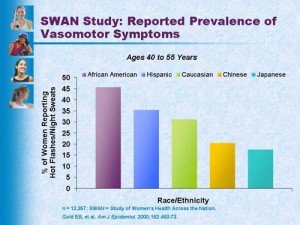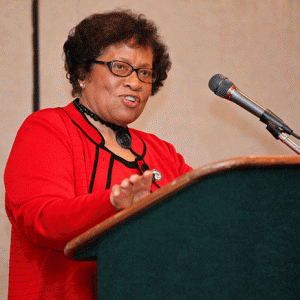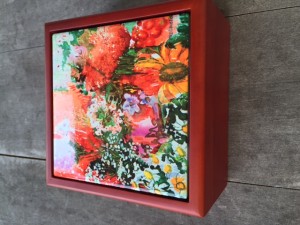 In
1996, right after I completed my Ph.D. in Sociology, I was randomly
selected as one of 3,302 women from diverse racial/ethnic backgrounds to
participate in this mid-life women’s health study called SWAN – or
Study of Women's Health Across the Nation. The study is following women
as we transition through menopause, to better understand the physical,
biological, psychological and social changes we experience during this
period. SWAN aims to help scientists, health care providers and women
“learn how mid-life experiences affect health and quality of life during
aging”. [2]
In
1996, right after I completed my Ph.D. in Sociology, I was randomly
selected as one of 3,302 women from diverse racial/ethnic backgrounds to
participate in this mid-life women’s health study called SWAN – or
Study of Women's Health Across the Nation. The study is following women
as we transition through menopause, to better understand the physical,
biological, psychological and social changes we experience during this
period. SWAN aims to help scientists, health care providers and women
“learn how mid-life experiences affect health and quality of life during
aging”. [2]SWAN participants or “subjects” were all between 42 and 52 years old “at baseline” – that, is, when the study began – and we represent seven cities around the country, including my own city of Boston.
When I got the call inviting me to join the SWAN study, I had just completed a lengthy project that involved a lot of interviewing. I welcomed the opportunity to answer someone else’s questions! It also felt great to be a part of important research that had the prospects of influencing medical science. But when I said "yes" to participating in SWAN nearly 20 years ago, I could not have predicted that I would be interviewed by at least 10 or more 20-something research assistants, most of them en route to medical school following this "real-life" experience.
Last year, there was a funding hiatus for the study. I was having a tough year myself and barely noticed that I hadn’t gotten my annual call to set up an appointment. Then a month ago, a letter arrived. SWAN was back in biz, and I’d be getting a call soon! I was thrilled that the study was re-funded in this era of budget cuts for basic science and social science research. I was also feeling grateful that my health was back on track. It struck me that SWAN gave me a regular opportunity to reflect on my life’s circumstances, and to think about how I’m handling growing older, even if it’s only because of a series of questions read to me by a young research assistant whom I've just met.
Lila was trained to draw blood, and as she jabs me with the needle, I think, wow, she’s pretty good. We continue to chat, as she measures my waist and hips, clocks how fast I can walk down the narrow hallway, and how long I can balance in a variety of different positions. I'm feeling pretty cocky, until we get to the cognitive test, which they instituted about four years ago. Even though I think my memory is pretty good, being quizzed by a millennial is unnerving. I tell Lila that this test makes me anxious, and she says “yeah, everyone hates it”. That’s only somewhat reassuring, but I appreciate her attempt to normalize my response. Once it’s over – after I spat back a series of numbers and letters in order, and re-told a story about three children in a burning house being saved by a brave fire fighter – I tell myself, “good enough”. That was something my father used to say in moments of stress.
The SWAN Study has taken care to ensure that we are a diverse sample of participants.
In Boston, researchers over-sampled African-American women, meaning that the study has intentionally included a larger percentage of African-Americans than are represented in the general population. Other cities have ensured that the sample includes large numbers of Chinese, Japanese, and Hispanic women. This oversampling strategy allows researchers to investigate the influence of race and ethnicity on health outcomes of women as we age.
SWAN-affiliated researchers, Drs. Robin Green and Nanette Santoro, found that most symptoms of menopausal women varied by ethnicity. They write,
“Vasomotor
symptoms were more prevalent in African-American and Hispanic women and
were also more common in women with greater BMI, challenging the widely
held belief that obesity is protective against vasomotor symptoms”.
By including an ethnically diverse sample, the SWAN Study is able to compare the experiences of women from varied backgrounds, which has pointed to important differences that should be of great benefit to health care practitioners. Moreover, SWAN researchers provide participants with information about our health, and flag issues we should explore further. For example, I discovered that I had high cholesterol, something that runs in my family. I’m now being monitored by a specialist, who asked me to take a very lose dose of a Statin. And overall, I’m more conscientious about my diet. The upshot is that my cholesterol levels are under control.
Gathering the SWANS...
In the past couple of decades, the SWAN team held a number of gatherings to bring Boston SWAN “subjects” together. It's awesome to be in a room with hundreds of women with one thing in common: we are mid-life women who have gone through menopause! What fun to talk about all the crap we are experiencing without feeling judged or worrying that we might be boring someone.
The first gathering I attended offered workshops where “experts” could answer our questions about sleep (like hot flashes keeping us awake) or provide us with alternatives to Hormone Replacement Therapy. One year, SWAN researchers organized an event that featured the brilliant and outspoken Jocelyn Elders, former U.S. Surgeon General who was a lightning rod for speaking her mind, in support of legalizing marijuana, the distribution of contraceptives in schools, and even suggesting that masturbation might be a means of preventing young people from engaging in riskier forms of sexual activity. Sitting in a diverse crowd of mid-life women and cheering for Elders, whom I have admired for years, was positively thrilling.
Lila tells me a little about this year’s gathering, which I unfortunately missed. I learn that one of the Boston-based Principal Investigators, Dr. Joel Finkelstein, is a serious art aficionado and at the last SWAN Study gathering, he showed a series of paintings by an older woman. His message was that we can continue to grow and be creative as we age. When the interview is complete, Lila hands me my gift. In past years, it has been a cup or a small tote bag, marked with the graceful SWAN logo. But this year, it’s a small box, the top graced with a floral design from this artist.
In the abstract of his 2014 application to the National Institutes of Health, Dr. Finkelstein concluded by saying, “SWAN will fill important gaps in understanding the impact of the menopausal transition and mid-life aging on women's health and functioning in the postmenopausal years. Accordingly, it will provide useful information to guide clinical decisions in mid-life and beyond in women who have diverse life experiences and socioeconomic and racial/ethnic characteristics”.
I'm grateful to be a part of this longitudinal study, to know that the aggregate data being collected reflects a diverse population of women, and that we are collectively contributing to scientific knowledge that can improve the lives of women as we age.
Finally, here’s a great clip from Menopause, the Musical!, just for fun: https://www.youtube.com/watch?v=ndFBFXV3jjs
[1] Fictitious name
[2] The SWAN Study is co-sponsored by the National Institute on Aging (NIA), the National Institute of Nursing Research (NINR), the National Institutes of Health (NIH), Office of Research on Women's Health, and the National Center for Complementary and Alternative Medicine.


















